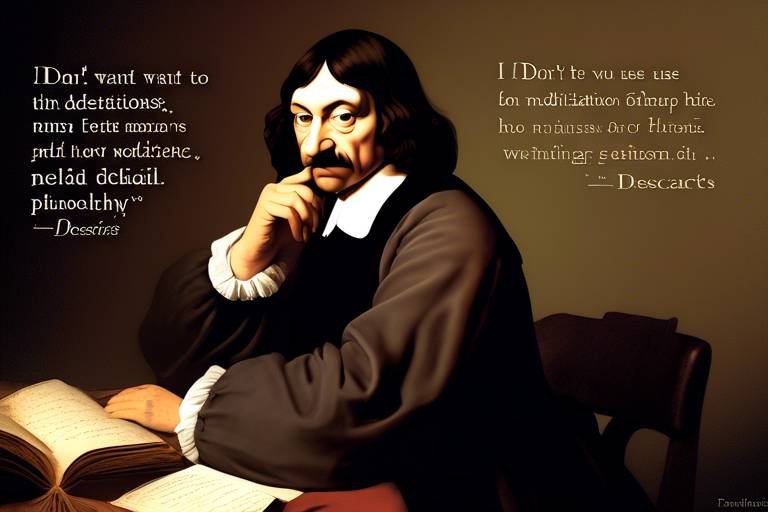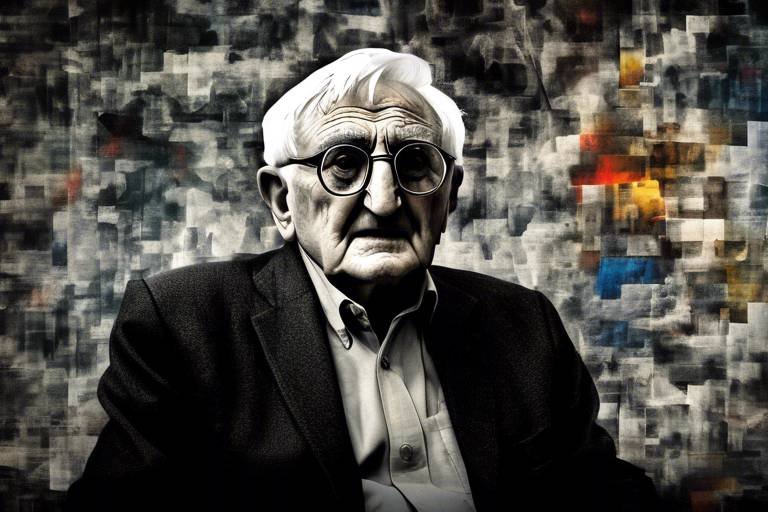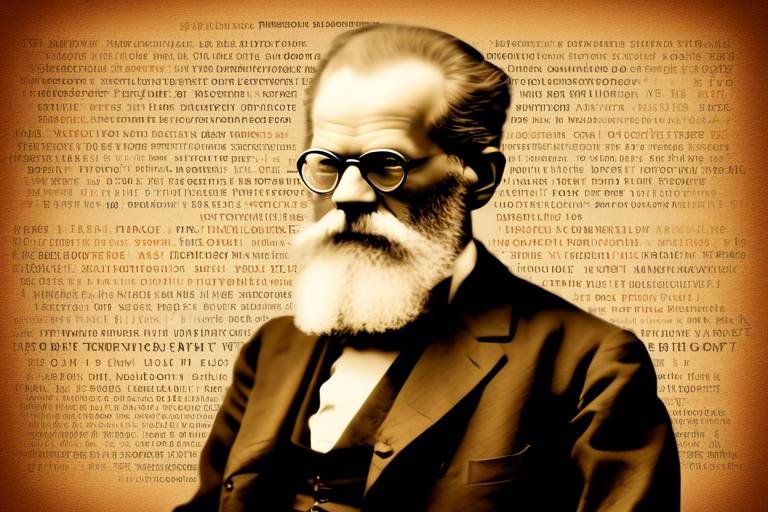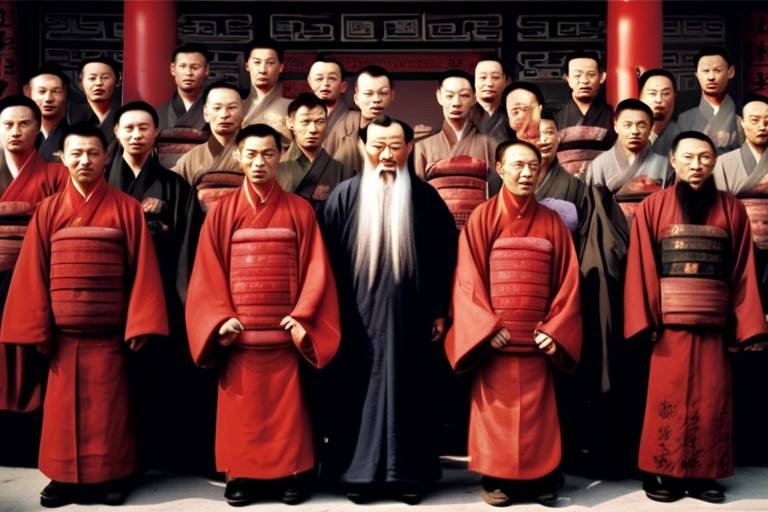Descartes vs. Locke - A Comparative Analysis of Their Philosophies
In the vast landscape of Western philosophy, two towering figures stand out: René Descartes and John Locke. Their contrasting views have not only shaped philosophical discourse but also influenced various fields such as psychology, science, and political theory. Imagine standing at a crossroads, where one path leads to the realm of rationalism and the other to the domain of empiricism. This article takes you on a journey through the intricate philosophies of these two thinkers, exploring how their ideas on knowledge, perception, and reality continue to resonate in our modern world.
At the heart of Descartes' philosophy lies rationalism, which posits that knowledge is primarily derived from reason and innate ideas. Descartes famously declared, "Cogito, ergo sum" ("I think, therefore I am"), emphasizing that the act of thinking is the foundation of all knowledge. In contrast, Locke introduced the concept of empiricism, asserting that the mind is a blank slate, or tabula rasa, at birth, and that all knowledge comes from sensory experiences. This fundamental difference sets the stage for their ongoing philosophical debate.
When it comes to metaphysics, Descartes and Locke diverge significantly. Descartes' dualism posits that reality consists of two distinct substances: the mind (or soul) and the body. He believed that the mind is non-material and exists independently of the physical world. Conversely, Locke's materialism suggests that everything we know is rooted in the physical world, and our understanding of reality is shaped by our interactions with it. This dichotomy raises profound questions about the essence of existence and the relationship between mind and matter.
In Descartes' view, the mind is the primary source of knowledge, a powerful tool capable of discerning truth through reason. He believed that through introspection and logical deduction, individuals could arrive at certain truths about the world. On the other hand, Locke argued that the mind is a blank slate, molded by experiences and perceptions. This perspective emphasizes the importance of empirical evidence and suggests that our understanding is inherently limited by our sensory experiences. It's as if Descartes sees the mind as a bright light illuminating the dark corners of ignorance, while Locke views it as a canvas waiting to be painted by the brush of experience.
Both philosophers approached the concept of perception from different angles. Locke firmly believed that sensory experience is the cornerstone of knowledge. He argued that our senses provide us with the raw data necessary to form ideas and concepts. In contrast, Descartes was skeptical about the reliability of the senses, famously stating that they can often deceive us. This skepticism leads him to prioritize the mind's capacity for reason over the sometimes misleading nature of sensory information. It's a classic case of trusting your gut versus trusting your brain, and the implications of their views extend far beyond mere philosophical debate.
The philosophical legacies of Descartes and Locke are profound and far-reaching. Descartes' emphasis on doubt and skepticism has paved the way for modern scientific inquiry, encouraging thinkers to question established truths and seek evidence-based answers. Meanwhile, Locke's ideas about the mind as a blank slate have influenced educational theories and the understanding of human development. Their contrasting views continue to shape contemporary discussions on consciousness, identity, and the nature of knowledge, making them essential figures in the ongoing quest for understanding.
When it comes to political philosophy, Locke's theories stand in stark contrast to Descartes' more abstract notions. Locke is best known for his social contract theory, which posits that governments derive their authority from the consent of the governed. He championed individual rights and the idea that people have the power to overthrow oppressive regimes. Descartes, on the other hand, offered a less direct approach to governance, focusing more on the role of reason in establishing order. This divergence highlights the practical implications of their philosophies, as Locke's ideas laid the groundwork for modern democratic thought.
Despite their monumental contributions, both Descartes and Locke have faced significant critiques. Descartes' reliance on reason has been challenged by those who argue that it overlooks the complexities of human emotion and experience. Critics of Locke's empiricism point out that sensory experiences can be subjective and unreliable. These critiques have led to refinements in their ideas, fostering ongoing debates that enrich the philosophical landscape.
The legacies of Descartes and Locke extend beyond philosophy into various fields. Their ideas have influenced psychology, particularly in understanding cognition and perception. In science, Descartes' method of systematic doubt has become a cornerstone of the scientific method, while Locke's thoughts on experience have shaped empirical research methodologies. Their political theories continue to resonate in discussions about governance and individual rights, emphasizing their relevance in contemporary society.
In conclusion, the philosophies of Descartes and Locke offer a rich tapestry of ideas that continue to inform our understanding of knowledge and existence. While they diverge in their approaches—rationalism versus empiricism, dualism versus materialism—their discussions about the nature of reality, the role of the mind, and the foundations of knowledge provide valuable insights that remain pertinent today. As we grapple with the complexities of modern life, the legacies of these two thinkers remind us of the enduring quest for understanding in a world filled with uncertainty.
- What is the main difference between Descartes and Locke? Descartes is a rationalist who emphasizes reason as the source of knowledge, while Locke is an empiricist who believes that knowledge comes from sensory experience.
- How did Descartes influence modern philosophy? Descartes' method of doubt and emphasis on reason laid the groundwork for the scientific method and modern philosophical inquiry.
- What is Locke's social contract theory? Locke's social contract theory posits that governments derive their authority from the consent of the governed and that individuals have the right to overthrow oppressive regimes.
- Why is the debate between rationalism and empiricism important? This debate addresses fundamental questions about how we acquire knowledge and understand reality, influencing various fields such as science, psychology, and politics.

Epistemology: Foundations of Knowledge
When we dive into the fascinating world of epistemology, we're essentially asking, "How do we know what we know?" This question lies at the heart of the philosophical debates between René Descartes and John Locke. Their contrasting views on knowledge not only shaped their own philosophies but also laid the groundwork for modern thought. Descartes, a firm believer in rationalism, posited that knowledge comes primarily from reason and innate ideas. In contrast, Locke championed empiricism, arguing that our understanding of the world is built upon sensory experiences.
Descartes famously declared, "Cogito, ergo sum" ("I think, therefore I am"), illustrating his belief that the act of thinking is the foundation of all knowledge. For him, the mind is the ultimate source of certainty. He believed that through doubt and reason, one could arrive at indubitable truths. In his view, clear and distinct perceptions, those that are evident to the mind, serve as the bedrock of knowledge. This approach leads to a systematic method of inquiry, where knowledge is built from the ground up, starting from self-evident truths.
On the flip side, Locke argued that the mind at birth is a tabula rasa or blank slate, filled only through experience. According to him, knowledge is not inherent but acquired through interaction with the world. He categorized knowledge into two types: intuitive knowledge, which is immediate and self-evident, and demonstrative knowledge, which requires reasoning. Locke's emphasis on sensory experience as the primary source of knowledge contrasts sharply with Descartes' rationalism. This divergence raises an intriguing question: Is knowledge something we uncover through our senses, or is it something that exists independently of our experiences?
The implications of their differing epistemological frameworks extend far beyond theoretical discussions. They influence how we approach education, science, and even everyday decision-making. For instance, in the scientific method, which heavily relies on observation and experimentation, we can see Locke's influence at play. Meanwhile, Descartes' method of systematic doubt encourages critical thinking and skepticism, pushing us to question our assumptions.
To better understand their contrasting views, let's take a look at the following table that summarizes their key differences:
| Aspect | Descartes (Rationalism) | Locke (Empiricism) |
|---|---|---|
| Source of Knowledge | Innate ideas and reason | Sensory experience |
| Nature of the Mind | Active and thinking | Blank slate |
| Method of Inquiry | Deductive reasoning | Inductive reasoning |
| Certainty of Knowledge | Achievable through rational thought | Requires empirical validation |
In conclusion, the epistemological foundations laid by Descartes and Locke offer us a rich tapestry of ideas that continue to challenge and inspire thinkers today. Their contrasting approaches to knowledge not only reflect their unique perspectives but also invite us to ponder our own understanding of reality. Are we more inclined to trust our reason, or do we find solace in the tangible experiences that shape our lives?

Metaphysics: Nature of Reality
The metaphysical landscape carved by René Descartes and John Locke presents a fascinating dichotomy that fundamentally shapes our understanding of existence. At the heart of this philosophical debate lies the question: What is the true nature of reality? Descartes, a staunch rationalist, posited a dualistic view that separated the mind and body into distinct entities. He famously declared, "Cogito, ergo sum" or "I think, therefore I am," suggesting that the act of thinking is evidence of one's existence. For Descartes, the mind was an immaterial substance, capable of independent thought and reason, which stood in stark contrast to the physical world.
On the other hand, Locke, an advocate of empiricism, approached reality from a materially grounded perspective. He argued that all knowledge arises from sensory experience, which means that our understanding of the world is built upon the information we gather through our senses. Unlike Descartes, Locke did not believe in innate ideas; instead, he viewed the mind as a tabula rasa or blank slate, shaped by our interactions with the environment. This leads to a more unified view of reality, where the mind and the material world are interconnected, as experience informs understanding.
To illustrate the contrast between these two philosophers, consider the following table:
| Aspect | Descartes | Locke |
|---|---|---|
| Nature of Reality | Dualism: Mind and body as separate entities | Materialism: Mind as a product of sensory experience |
| Source of Knowledge | Rationalism: Knowledge through reason | Empiricism: Knowledge through experience |
| Innate Ideas | Belief in innate ideas | No innate ideas; knowledge is acquired |
This fundamental difference in their metaphysical outlooks leads to significant implications for how we perceive not just our own existence, but the universe at large. For Descartes, the assurance of one's existence stems from the capacity for thought, while for Locke, it is the richness of sensory experiences that constructs our reality. This divergence raises intriguing questions about the essence of being. Are we merely thinking beings, or are we defined by our interactions with the world around us?
Moreover, the implications of these contrasting views extend beyond philosophy into various fields such as psychology and neuroscience. For instance, modern cognitive science often grapples with the question of consciousness—does it arise solely from brain activity, or is there an immaterial aspect to our being? Descartes' dualism opens the door to discussions about the soul, while Locke's materialism aligns more closely with contemporary scientific inquiry.
In conclusion, the metaphysical debates between Descartes and Locke illuminate the complexities surrounding the nature of reality. Their contrasting views not only highlight the philosophical divide between rationalism and empiricism but also challenge us to reflect on our own beliefs about existence. As we navigate through these philosophical waters, we are left pondering: Is reality a construct of our minds, or is it an objective universe that we merely observe?
- What is Descartes' view on the mind and body?
Descartes believes in dualism, where the mind and body are two distinct substances. He argues that the mind is immaterial and the source of thought, while the body is physical and operates in the material world. - How does Locke's philosophy differ from Descartes'?
Locke is an empiricist who posits that knowledge comes from sensory experience. He rejects the idea of innate knowledge, suggesting that the mind is a blank slate shaped by experiences. - What is the significance of the mind-body problem?
The mind-body problem explores how mental states (thoughts, feelings) relate to physical states (brain activity, bodily functions). This issue remains central in philosophy, psychology, and neuroscience.

The Role of the Mind
When we dive into the philosophical waters of René Descartes and John Locke, one of the most fascinating aspects to explore is . You see, Descartes, often hailed as the father of modern philosophy, had a rather bold assertion: “Cogito, ergo sum” or “I think, therefore I am.” This statement encapsulates his belief that the mind is the primary source of knowledge. For Descartes, the act of thinking is not just an activity; it is the very essence of existence. He posited that the mind, a non-material substance, is distinct from the body, and it is through rational thought that we can attain true knowledge.
In contrast, John Locke took a different approach. He famously argued that the mind is a blank slate (tabula rasa) at birth, shaped by experiences and sensory perceptions. For Locke, knowledge is not innate; rather, it is constructed through interaction with the world. Imagine a young child learning to identify colors: they don’t know what “red” is until they see a red apple. This experiential learning process is central to Locke’s philosophy, suggesting that the mind is more like a sponge, absorbing information rather than a vessel of pre-existing ideas.
To illustrate the differences between these two philosophers, let’s consider a simple table:
| Aspect | Descartes | Locke |
|---|---|---|
| View of the Mind | Non-material, distinct from the body | Blank slate, shaped by experience |
| Source of Knowledge | Rational thought | Sensory experience |
| Nature of Existence | Certainty through doubt | Knowledge through experience |
This divergence in understanding the mind leads to profound implications. Descartes’ emphasis on reason paved the way for the development of rationalist thought, influencing countless thinkers who followed. His approach suggests that through careful reasoning, one can arrive at undeniable truths. Conversely, Locke’s empiricism has had a lasting impact on fields like psychology and education, emphasizing the importance of experiential learning and observation.
Moreover, the implications of these philosophies extend beyond academia. In our daily lives, how often do we rely on our reasoning versus our experiences? When making decisions, do we trust our gut feelings or analyze the situation critically? Understanding these philosophical perspectives can help us navigate the complexities of thought and experience, shaping our interactions with the world.
In essence, the role of the mind in philosophy is not merely an academic exercise; it’s a reflection of how we perceive reality itself. Both Descartes and Locke offer invaluable insights, challenging us to consider the interplay between thought and experience. As we continue to grapple with questions of knowledge and existence, their legacies remind us that the mind is a powerful tool—whether it’s a rational engine or a canvas waiting to be painted by the experiences of life.
- What is Descartes' view of the mind? Descartes believed that the mind is a non-material substance that is distinct from the body and is the primary source of knowledge through rational thought.
- How does Locke's perspective differ? Locke argued that the mind is a blank slate at birth, shaped by sensory experiences, emphasizing the importance of empirical learning.
- Why is the role of the mind important in philosophy? The role of the mind is crucial as it influences our understanding of knowledge, existence, and our interactions with the world.

Perception and Sensory Experience
When it comes to perception and sensory experience, the philosophical paths of René Descartes and John Locke diverge dramatically. Descartes, the father of modern philosophy, was deeply skeptical about the reliability of the senses. He famously declared, "Cogito, ergo sum" ("I think, therefore I am"), suggesting that the act of thinking is the only certainty we can hold. For Descartes, the senses can deceive us; what we perceive through them may not truly reflect reality. Imagine walking through a foggy night—what appears to be a figure in the distance could just be a tree. This analogy encapsulates Descartes' belief that our senses are not always trustworthy guides to understanding the world.
On the flip side, we have John Locke, who championed the idea that knowledge originates from sensory experiences. In his work, he described the mind as a tabula rasa or blank slate at birth, suggesting that all knowledge is built upon experiences we gather through our senses. Locke argued that our understanding of the world is formed through a series of impressions and reflections. To illustrate, consider how a child learns about a dog: first, they see one (an impression), then they hear it bark, and finally, they might touch its fur (a reflection). Each sensory experience layers upon the last, gradually shaping their understanding of what a dog is.
Locke's perspective places significant emphasis on the importance of empirical evidence. He believed that without sensory experience, we would be left in a state of ignorance. This viewpoint stands in stark contrast to Descartes' rationalism, where the mind is the ultimate arbiter of truth. For Locke, the senses are not just useful; they are essential. He proposed that knowledge gained through experience is the most reliable form of knowledge, as it is grounded in the tangible world. This leads us to ask: can we truly know anything without our senses? Locke would argue a resounding "no."
Despite their differences, both philosophers acknowledge the role of perception, albeit in fundamentally different ways. Descartes’ skepticism invites us to question what we see and hear, urging us to seek deeper truths beyond mere appearances. In contrast, Locke’s empiricism encourages us to trust our senses, as they are the gateways to understanding our surroundings. This dichotomy raises intriguing questions about the nature of reality: Are we merely deceived by our senses, or do they serve as our only means to grasp the world around us?
In conclusion, the contrasting views of Descartes and Locke on perception and sensory experience not only highlight their philosophical differences but also set the stage for ongoing debates in epistemology. Their ideas continue to resonate in discussions about how we acquire knowledge and the extent to which our senses can be trusted. As we navigate our daily lives, these questions remain relevant, prompting us to consider how we perceive the world and the knowledge we derive from those perceptions.
- What is the main difference between Descartes and Locke regarding perception? Descartes was skeptical of the senses, believing they can deceive us, while Locke argued that sensory experience is the foundation of all knowledge.
- How does Locke's concept of the mind differ from Descartes'? Locke viewed the mind as a blank slate shaped by experiences, whereas Descartes emphasized the mind as the primary source of knowledge.
- Why is sensory experience important in Locke's philosophy? For Locke, sensory experience is crucial because it forms the basis for all knowledge, allowing individuals to understand and interpret the world around them.

Influence on Modern Philosophy
The philosophies of René Descartes and John Locke have profoundly shaped modern philosophical thought, creating a foundation that continues to influence contemporary discussions on various topics such as consciousness, identity, and the nature of knowledge. Their contrasting views have not only sparked debates among philosophers but also laid the groundwork for numerous fields, including psychology, science, and political theory.
Descartes, often hailed as the father of modern philosophy, introduced the idea of methodical doubt and the famous dictum "Cogito, ergo sum" ("I think, therefore I am"). This emphasis on doubt as a tool for discovering certainty has led to a greater focus on the individual's role in the pursuit of knowledge. His dualistic view, separating mind and body, has opened up discussions on the nature of consciousness and the self, influencing existentialists and phenomenologists alike. For instance, philosophers like Jean-Paul Sartre and Martin Heidegger have expanded on Descartes' ideas, exploring the implications of human existence and the subjective experience.
On the other hand, Locke's empiricism challenges the notion of innate ideas, proposing that the mind is a tabula rasa or blank slate, shaped entirely by sensory experiences. This perspective has had a significant impact on the development of scientific methodology and the understanding of human psychology. Locke's ideas laid the groundwork for the empirical sciences, emphasizing observation and experience as the primary sources of knowledge. Modern psychologists and cognitive scientists often reference Locke's theories when discussing how experiences shape perceptions and behaviors.
Moreover, Locke's social contract theory has been instrumental in shaping modern political philosophy. His ideas about government, individual rights, and the role of the state have influenced democratic thought and practices. Thinkers like Thomas Jefferson and John Stuart Mill drew heavily from Locke's principles to advocate for liberty, equality, and justice, which are cornerstones of modern democratic societies.
In summary, the legacies of Descartes and Locke are evident in various aspects of contemporary philosophy and beyond. Their contrasting approaches to knowledge and reality have fostered rich discussions that continue to resonate today. As we navigate the complexities of modern life, the questions they raised remain relevant, prompting us to explore the depths of human understanding and existence.
- What is the main difference between Descartes and Locke?
Descartes is known for his rationalism and the idea of innate knowledge, while Locke is recognized for his empiricism and the belief that knowledge comes from experience. - How did Descartes influence modern science?
Descartes emphasized the importance of doubt and systematic reasoning, laying the groundwork for the scientific method and the objective study of the natural world. - What impact did Locke have on political philosophy?
Locke's social contract theory and ideas about individual rights significantly influenced the development of democratic governance and human rights concepts.

Political Philosophy: Views on Governance
When we dive into the political philosophies of René Descartes and John Locke, we find ourselves navigating through two distinct landscapes of thought. Descartes, often recognized for his contributions to rationalism, approached governance with a somewhat abstract lens. He believed in the power of reason and the innate ideas within the human mind, suggesting that a well-ordered society could emerge from rational deliberation. In his view, governance should be guided by a rational understanding of human nature and the principles of logic, leading to a more structured and possibly authoritarian form of rule.
On the other hand, Locke's perspective on governance is grounded in empiricism, emphasizing the importance of experience and observation. He is famously known for his theory of the social contract, which posits that governments are formed through the consent of the governed. Locke argued that individuals possess natural rights to life, liberty, and property, and that the primary role of government is to protect these rights. This starkly contrasts with Descartes' more theoretical approach, as Locke's views advocate for a government that is accountable to the people and must operate within the bounds of the law.
To illustrate the differences further, let’s look at a comparative table:
| Aspect | René Descartes | John Locke |
|---|---|---|
| Foundation of Governance | Rationalism and innate ideas | Empiricism and social contract |
| View on Human Nature | Rational beings capable of logical thought | Individuals with natural rights |
| Type of Governance | Potentially authoritarian | Democratic and accountable |
| Role of Government | Guided by reason and logic | Protecting natural rights |
Locke’s ideas laid the groundwork for modern democratic thought, influencing the development of liberal political philosophy. His belief in the right to revolt against unjust governance resonates strongly in contemporary discussions about democracy and individual freedoms. In contrast, Descartes’ more abstract notions of governance have been less directly influential in political theory but have contributed to the broader understanding of human reasoning and its implications for leadership.
In summary, while Descartes and Locke both sought to understand the nature of governance, their approaches reflect their broader philosophical commitments. Descartes’ rationalism leads to a more structured and possibly rigid view of authority, whereas Locke’s empiricism champions the rights of individuals and the necessity of government accountability. This divergence not only highlights their differing views on governance but also sets the stage for ongoing debates in political philosophy that are still relevant today.
- What is the main difference between Descartes and Locke's political philosophies? Descartes emphasizes rationalism and the role of reason in governance, while Locke focuses on empiricism and the protection of natural rights through a social contract.
- How did Locke's ideas influence modern democracy? Locke's theories on natural rights and the social contract laid the foundation for democratic principles, advocating for government accountability and individual freedoms.
- Can Descartes' views on governance be applied today? While Descartes' ideas are more abstract, they can still inform discussions about the role of reason and logic in leadership and decision-making processes.

Critiques and Counterarguments
The philosophies of René Descartes and John Locke have not only shaped the landscape of modern thought but have also faced significant scrutiny and critique over the years. While both philosophers laid foundational stones for epistemology and metaphysics, their ideas have been challenged on various fronts. For instance, Descartes' reliance on rationalism has been criticized for its potential to overlook the importance of sensory experience. Critics argue that by prioritizing the mind as the primary source of knowledge, Descartes risks dismissing the vital role that empirical evidence plays in understanding our world.
On the other hand, Locke's empiricism has faced its own set of counterarguments. Detractors question the idea of the mind as a blank slate, suggesting that this perspective may underestimate the innate ideas and predispositions that influence human thought and perception. The debate over whether knowledge is primarily derived from experience or from innate concepts continues to provoke discussion among philosophers, psychologists, and educators alike.
Moreover, both philosophers have been critiqued for their views on the nature of reality. Descartes' dualism, which posits a strict separation between mind and body, has been challenged by those advocating for a more integrated understanding of human experience. Critics argue that such a division leads to a fragmented view of existence, where the complexities of human consciousness cannot be adequately explained. In contrast, Locke's materialism has been questioned for potentially reducing the richness of human experience to mere physical interactions, neglecting the subjective aspects of consciousness.
To illustrate some of these critiques, consider the following table that summarizes key criticisms of Descartes and Locke:
| Philosopher | Critique | Counterargument |
|---|---|---|
| René Descartes | Overemphasis on rationalism | Rational thought is essential for certain types of knowledge |
| John Locke | Neglect of innate ideas | Experience shapes our understanding, but innate ideas can exist |
| Descartes | Dualism creates a fragmented view of reality | Mind-body distinction is necessary for understanding consciousness |
| Locke | Materialism oversimplifies human experience | Focus on experience is crucial for knowledge acquisition |
Additionally, the political philosophies of both thinkers have also come under scrutiny. Locke's social contract theory, while revolutionary, has been criticized for its idealism and lack of practical application in real-world governance. Critics argue that the assumption of a rational individual entering into a social contract fails to account for the complexities of human behavior and societal dynamics. Descartes, with his more abstract notions of governance, has been seen as disconnected from the practical needs of society, leading to questions about the applicability of his ideas in contemporary political discourse.
In conclusion, while Descartes and Locke have significantly influenced philosophical thought, their ideas are not without their critics. The ongoing debates surrounding their philosophies highlight the dynamic nature of knowledge and understanding, as each new critique encourages further exploration and refinement of these foundational concepts.
- What are the main differences between Descartes and Locke?
Descartes emphasized rationalism and the role of the mind, while Locke focused on empiricism and the importance of sensory experience. - How did Descartes' dualism impact modern philosophy?
Descartes' dualism introduced the concept of separating mind and body, influencing discussions on consciousness and identity. - Why is Locke's blank slate theory significant?
Locke's theory suggests that knowledge is formed through experience, which has implications for education and psychology. - What critiques have emerged regarding their political philosophies?
Both philosophers have faced criticism for their idealistic views on governance that may not align with real-world complexities.
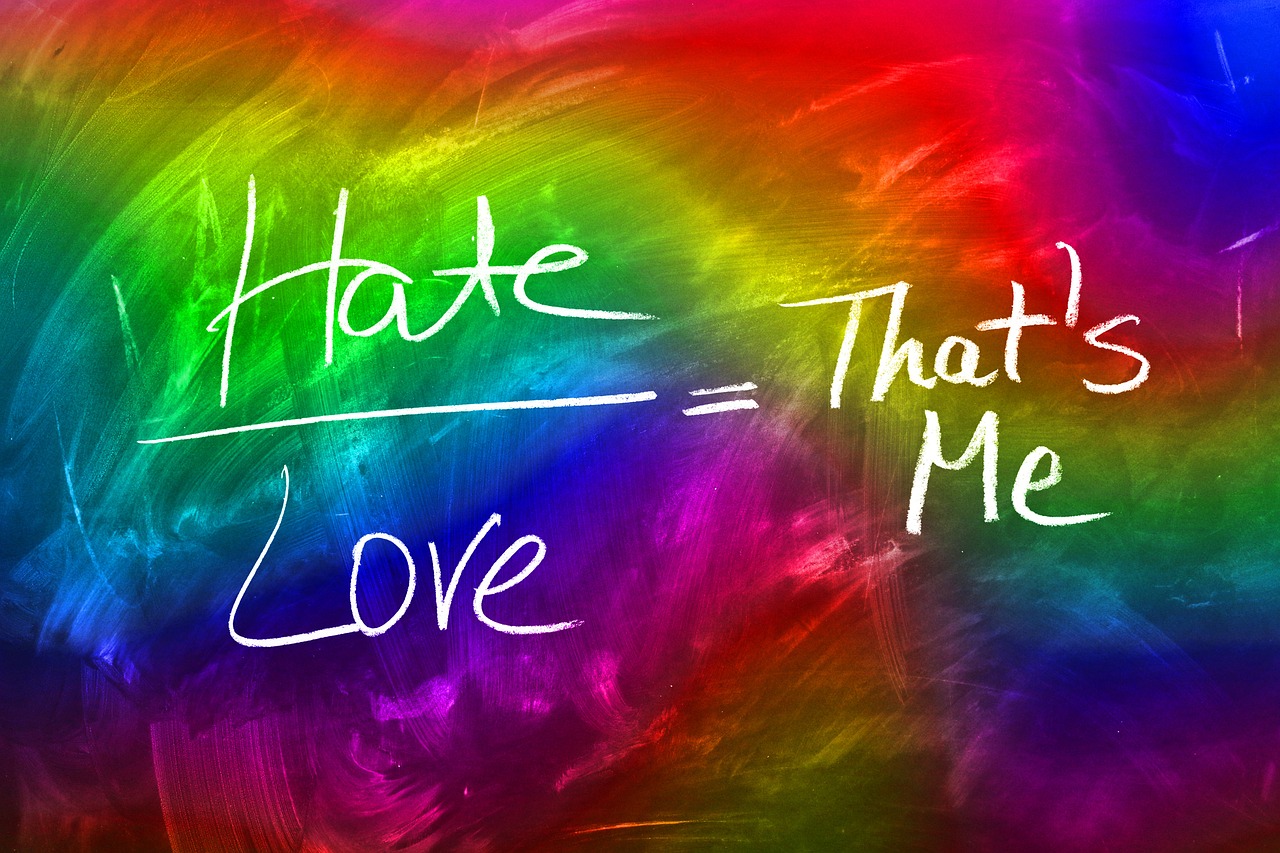
Legacy and Impact
The legacies of René Descartes and John Locke are monumental, shaping not just philosophy, but also the realms of science, psychology, and political theory. Their ideas have transcended their own time, influencing countless thinkers and movements across centuries. Descartes, often hailed as the father of modern philosophy, introduced a method of doubt that encouraged a rigorous examination of beliefs, fundamentally changing how knowledge was perceived. His famous dictum, "I think, therefore I am," emphasizes the certainty of self-awareness, which laid the groundwork for discussions on consciousness and existence.
On the other hand, Locke's contributions to empiricism and the philosophy of mind have been equally transformative. His assertion that the mind is a tabula rasa, or blank slate, challenged the prevailing notions of innate ideas and underscored the importance of experience in shaping knowledge. This perspective not only influenced the development of modern psychology but also sparked debates regarding education and human development that resonate to this day.
In terms of political philosophy, Locke's ideas about the social contract and natural rights were revolutionary. His thoughts on governance laid the groundwork for modern democratic theory, advocating for the idea that government should be based on the consent of the governed. This notion has had a profound impact on political movements worldwide, inspiring revolutions and the formation of democratic institutions.
To illustrate the impact of these two philosophical giants, consider the following table that summarizes their contributions across various fields:
| Field | Descartes' Contribution | Locke's Contribution |
|---|---|---|
| Philosophy | Method of doubt, foundationalism | Empiricism, tabula rasa |
| Science | Cartesian coordinate system, rationalism | Influence on scientific method through empirical observation |
| Psychology | Focus on consciousness and self-awareness | Development of theories on learning and development |
| Political Theory | Abstract notions of governance | Social contract theory, natural rights |
Both philosophers have also sparked ongoing debates in contemporary discourse. For instance, Descartes' dualism continues to be a point of contention in discussions about the mind-body problem, while Locke's theories on personal identity and consciousness challenge modern understandings of selfhood in a rapidly changing world. Their ideas have become foundational in the study of ethics, epistemology, and metaphysics, often serving as a launching point for new theories and critiques.
In summary, the legacies of Descartes and Locke are not merely historical footnotes; they represent enduring frameworks that continue to shape our understanding of knowledge, reality, and governance. Their philosophies invite us to question our own beliefs and the very nature of existence, ensuring that their impact will be felt for generations to come.
- What is the main difference between Descartes and Locke's views on knowledge? Descartes emphasized rationalism and innate ideas, while Locke focused on empiricism and the role of sensory experience.
- How did Descartes influence modern philosophy? His method of doubt and focus on self-awareness laid the groundwork for many modern philosophical inquiries, particularly in epistemology and metaphysics.
- What is Locke's significance in political theory? Locke's ideas about the social contract and natural rights have been foundational in the development of democratic theory and practice.

Conclusion: Reconciling Differences
In the grand tapestry of philosophy, the contrasting ideas of René Descartes and John Locke weave a narrative that is both rich and complex. While Descartes champions the notion of rationalism, asserting that reason is the primary source of knowledge, Locke counters with his compelling argument for empiricism, emphasizing that our understanding of the world is built upon sensory experiences. This divergence highlights a fundamental question that resonates through the ages: What is the true foundation of our knowledge?
Despite their differences, it’s important to recognize that both philosophers contribute significantly to our understanding of reality. Descartes’ dualism, which separates the mind and body, and Locke’s materialism, which posits that our perceptions are rooted in the physical world, offer two sides of the same coin. They challenge us to think critically about our own beliefs and the sources from which we derive our understanding of existence.
Moreover, the interplay between their thoughts extends beyond mere academic debate. The implications of their philosophies can be seen in contemporary discussions surrounding consciousness, identity, and the essence of knowledge. For instance, Locke’s idea of the mind as a tabula rasa, or blank slate, invites us to consider how our experiences shape our identities. In contrast, Descartes’ assertion that “I think, therefore I am” encourages a deeper exploration of self-awareness and the nature of existence itself.
In reconciling their differences, we find a richer understanding of human thought and perception. Both philosophers compel us to ask questions and seek answers, ultimately enriching the philosophical landscape. Their works remind us that knowledge is not a static entity but a dynamic interplay of ideas that evolve over time.
- What are the main differences between Descartes and Locke?
Descartes focuses on rationalism, believing that knowledge comes primarily from reason, while Locke emphasizes empiricism, arguing that knowledge is derived from sensory experience.
- How did Descartes influence modern philosophy?
Descartes laid the groundwork for modern rationalist thought, influencing discussions on consciousness and identity.
- What is the significance of the mind-body problem?
Descartes' dualism raises questions about the relationship between mental and physical states, which remains a central issue in philosophy and psychology.
- How does Locke's theory of knowledge apply today?
Locke's concept of the mind as a blank slate continues to inform discussions on education, psychology, and identity formation.
Frequently Asked Questions
- What are the main differences between Descartes and Locke's philosophies?
Descartes is known for his rationalist approach, emphasizing reason as the primary source of knowledge, while Locke represents empiricism, asserting that knowledge comes from sensory experience. This fundamental difference shapes their views on the nature of reality and the role of the mind.
- How do Descartes and Locke view the mind?
Descartes regards the mind as a distinct entity capable of independent thought, famously stating "Cogito, ergo sum" (I think, therefore I am). In contrast, Locke believes the mind is a blank slate (tabula rasa) at birth, molded by experiences and perceptions over time.
- What is the significance of Descartes' dualism?
Descartes' dualism posits that reality consists of two distinct substances: mind and body. This perspective laid the groundwork for discussions about consciousness and identity, influencing not only philosophy but also psychology and neuroscience.
- How does Locke's view on sensory experience differ from Descartes' skepticism?
Locke champions sensory experience as the foundation of knowledge, arguing that our understanding of the world is built through our interactions with it. Conversely, Descartes is skeptical of the senses, believing they can be deceptive, and thus emphasizes reason over perception.
- In what ways have Descartes and Locke influenced modern philosophy?
Both philosophers have profoundly shaped contemporary discussions on knowledge, consciousness, and identity. Descartes' ideas about the mind-body problem continue to be explored in philosophy of mind, while Locke's social contract theory informs modern political thought and theories of governance.
- What critiques exist regarding Descartes and Locke's philosophies?
Critics argue that Descartes' reliance on reason may overlook the complexities of human experience, while Locke's empiricism has been challenged for not adequately addressing innate ideas and the role of reason in knowledge acquisition. These critiques have led to further developments in philosophical thought.
- What is the legacy of Descartes and Locke today?
Their philosophies remain relevant across various fields, including psychology, science, and political theory. The discussions they initiated about knowledge, existence, and governance continue to influence modern thought and debate, showcasing the enduring impact of their ideas.








